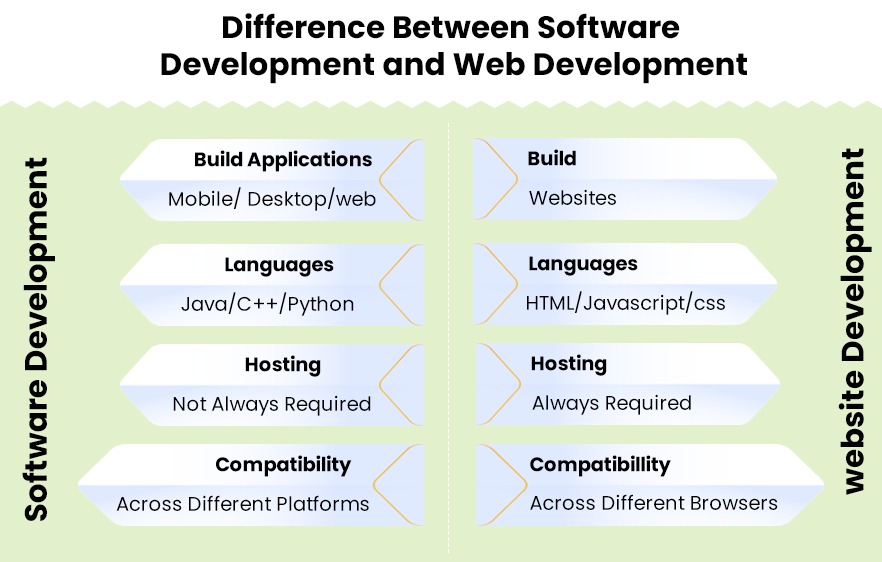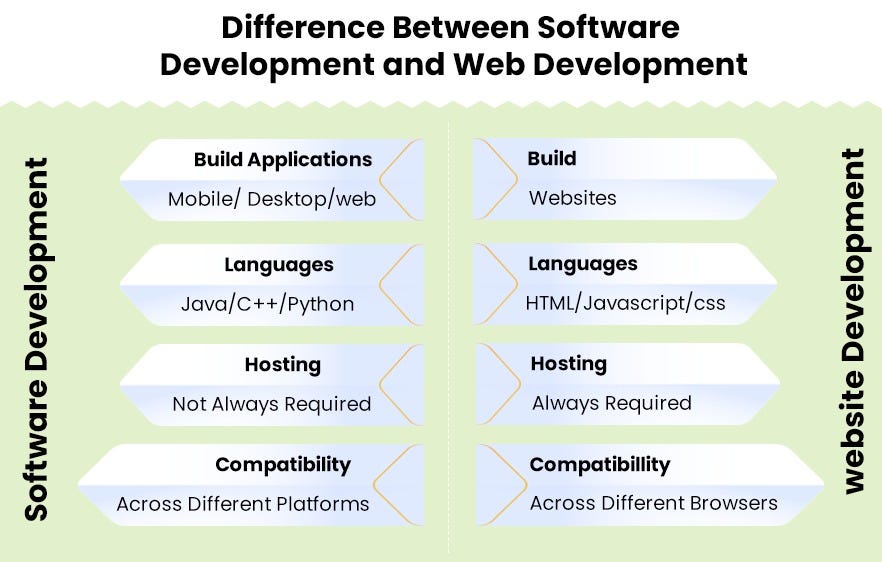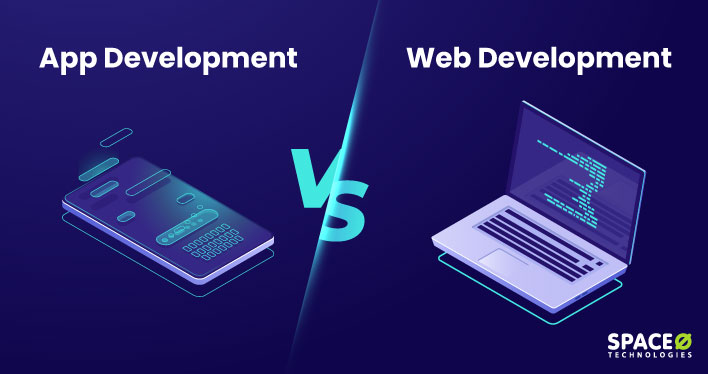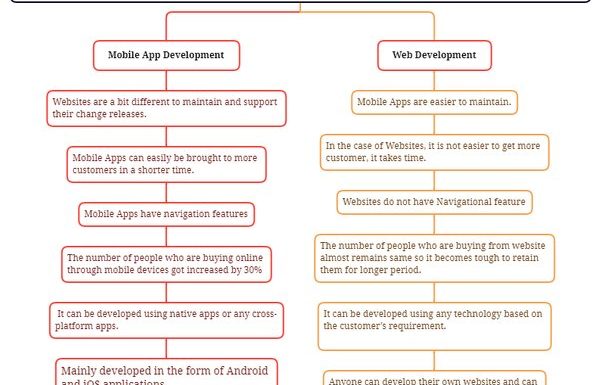Web development focuses on creating websites for browsers, while app development is geared toward building applications for mobile and desktop operating systems. Web development often centers on HTML, CSS, and JavaScript, while app development utilizes platform-specific languages and frameworks like Swift for iOS and Kotlin for Android.
In today’s digital landscape, distinguishing between web development and app development is key for businesses aiming to establish a strong online presence. Web developers craft interactive experiences that run on web browsers, ensuring users across varying devices have seamless access to content.
Their work enables websites to be responsive and perform well on laptops, tablets, and smartphones. On the other hand, app developers design software for specific platforms or devices, focusing on native user experiences that take full advantage of the hardware’s capabilities. Deciding between web and app development typically hinges on the target audience and the functionality required. Embracing both areas can provide comprehensive coverage, catering to users who demand both browser-based interactions and dedicated software applications.

Credit: itechindia.co
Table of Contents
Defining Web Development
Web development shapes the internet experience. It involves creating websites that are accessible through a web browser. Web developers work on everything you see online, from simple text pages to complex social networks. Their craft impacts how users interact with the web.
Core Aspects Of Web Development
Key elements define web development. These ensure sites are both functional and appealing. Let’s dive into these aspects.
- Front-end Development: This is the user-facing part of a website. It involves layout, design, and interactivity.
- Back-end Development: It’s the server side. This area manages data and serves it to users.
- Full-stack Development: This combines both front and back-end. Developers here can handle the entire process.
Languages And Frameworks Used
Several languages and frameworks form the foundation of web development. They empower developers to build diverse web solutions.
| Type | Languages | Frameworks |
|---|---|---|
| Front-end | HTML, CSS, JavaScript | React, Angular, Bootstrap |
| Back-end | Python, Ruby, PHP | Django, Ruby on Rails, Laravel |
Each language and framework has unique features. They tackle different tasks in web development. Choosing the right combination depends on the project’s needs.

Credit: karen-j.medium.com
Anatomy Of App Development
App development crafts software for mobile devices and digital assistants. Unlike web development, it targets specific platforms. Users download apps from app stores. They expect fast, responsive, and device-compatible applications.
Essential Components
Each app consists of crucial elements that ensure functionality, user engagement, and performance.
- User Interface (UI): The visual part of the app that users interact with.
- User Experience (UX): How the user feels when operating the app.
- Front-end: The client-side part dealing with user interaction.
- Back-end: The server-side involving databases and server logic.
- APIs: Interfaces that allow different software pieces to communicate.
Tools For Building Apps
Developers use various tools to create and test applications. Here’s what they often choose:
| Type of Tool | Examples |
|---|---|
| IDEs (Integrated Development Environments) | Android Studio, Xcode |
| Frameworks | React Native, Flutter |
| Design Tools | Sketch, Adobe XD |
| Version Control Systems | Git, SVN |
| Testing Tools | Appium, Jest |
User Interaction And Experience
When we pick up our phones or sit at our computers, we dive into worlds of apps and websites. Each time, we step into a different experience. People build these worlds using web development for websites and app development for apps. This is the art of making everything look good and work well for users like you.
Design Considerations In Web Vs. App
Design paints the picture users see. In web development, the picture must change sizes gracefully. A website has to look perfect on a big computer screen or a small phone. This is called responsive design. For app development, designers know exactly what phone or tablet you might use. They craft designs that feel like they belong on your device.
- Web: Needs flexible layouts for many devices
- Apps: Can be tailor-made for specific screens
Navigational Differences
Moving around in a website or an app should feel easy. Navigation is how you move from one place to another. In web development, navigation happens with clicks and links. For apps, you might swipe, tap, or even shake your phone. Apps often use phone features like a camera. Websites stick to simple tools that work for everyone, everywhere.
| Web | Apps |
|---|---|
| Uses links and menus | Uses gestures and device features |
Development Process And Resources
The ‘Development Process and Resources’ for building websites and applications are considerably distinct realms. Each comes with unique stages, tools, and skills that bring these digital solutions to life.
Development Lifecycle Variations
Web development and app development maintain different lifecycles. This stems from the end products’ nature. Websites are versatile, often needing frequent updates for content, security, and technology. Applications, however, enter a more fixed cycle; after launch, they move to maintenance and sporadic feature releases.
- Web Development: involves stages such as planning, design, content creation, coding, testing, and deployment with ongoing maintenance.
- App Development: includes concept, design, development, testing, launch, and post-launch phases such as updates and bug fixes.
Resource Accessibility
The tools and resources necessary for creating websites and apps can vary in accessibility and complexity.
| Web Development | App Development |
|---|---|
| Accessible with basic tools such as HTML, CSS, JavaScript | Requires specialized tools like Swift for iOS, Kotlin or Java for Android |
Resource accessibility also pertains to the skills needed to use these tools effectively. Web developers often need a solid grasp of SEO and responsiveness to ensure sites perform well across devices. App developers, meanwhile, must master platform-specific guidelines to optimize user experience and performance.
- Web developers frequently update their skills to align with web standards.
- App developers regularly adapt to changes in the operating system and mobile hardware.
Monetization And Market Reach
Understanding how web and app development create revenue is vital. Each platform offers different paths for profits. Those paths align with the platform’s unique market coverage and audience.
Earning Models For Web And Apps
Web development and app development both offer distinct earning models. Web developers often rely on advertising, subscriptions, or selling products directly. App developers may use in-app purchases, ads, or app sales.
- Advertising: Websites can display ads, while apps can show ads or offer ad-free versions.
- Subscriptions: Both can offer premium content for a fee.
- Product Sales: E-commerce is popular on websites, while apps may sell virtual goods.
- In-App Purchases: Apps can sell features or content within the app itself.
Target Audience And Market Penetration
Choosing between web and app depends on your target audience. Websites reach a global audience with internet access. Apps target users on specific devices.
| Platform | Global Reach | Device-Specific Users |
|---|---|---|
| Web Development | High | Low |
| App Development | Varies | High |
Apps can excel in market penetration if they cater to popular devices. Websites are accessible to anyone with a browser.

Credit: www.spaceotechnologies.com
Frequently Asked Questions For What Is The Difference Between Web Development And App Development
What Is Web Development?
Web development involves creating and maintaining websites, focusing on aspects like website design, functionality, and content management.
How Does App Development Differ?
App development specifically pertains to creating applications for mobile or desktop platforms, requiring knowledge of different operating systems and programming languages.
Why Choose Web Over App Development?
Choosing web development often relates to a desire for wider accessibility and ease of updates, as web applications can run on multiple platforms with a single codebase.
Conclusion
Understanding the nuances between web and app development is crucial. Each has unique benefits tailored to specific needs. Whether you prioritize widespread access with web development or rich features through app development, your project’s success hinges on selecting the right approach.
Choose wisely to ensure your digital solution thrives in the competitive tech landscape.

Leave a Reply